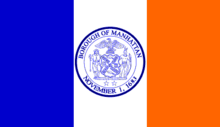Edward R. Dudley
Edward Richard Dudley (March 11, 1911 – February 10, 2005) was a lawyer, judge, civil rights activist and the first African-American to hold the rank of Ambassador of the United States, serving as Ambassador to Liberia from 1949 to 1953.
Edward R. Dudley | |
|---|---|
| Borough President of Manhattan | |
| In office January 31, 1961 – December 31, 1964 | |
| Preceded by | Hulan E. Jack |
| Succeeded by | Constance Baker Motley |
| United States Ambassador to Liberia | |
| In office May 6, 1949 – June 15, 1953 | |
| President | Harry Truman Dwight Eisenhower |
| Preceded by | Himself |
| Succeeded by | Jesse D. Locker |
| Envoy Extraordinary and Minister Plenipotentiary to Liberia | |
| In office October 18, 1948 – March 2, 1949 | |
| President | Harry Truman |
| Preceded by | Raphael O'Hara Lanier |
| Succeeded by | Himself Promoted to Ambassador Extraordinary and Plenipotentiary March 18, 1949 |
| Personal details | |
| Born | Edward Richard Dudley March 11, 1911 South Boston, Virginia, U.S. |
| Died | February 10, 2005 (aged 93) Manhattan, New York, U.S. |
| Political party | Democratic |
| Spouse(s) | Rae Oley Dudley |
| Alma mater | Johnson C. Smith University Howard University St. John's University School of Law |
Life
Dudley graduated with a B.S. degree from Johnson C. Smith College in 1932 where he became a member of Alpha Phi Alpha fraternity, and then taught school in Gainsboro, Virginia. He studied dentistry for a year on a scholarship at Howard University, and then moved to New York City. His wife was Rae (Elizabeth) Oley Dudley and had one child, Edward Richard Dudley jr.
In New York, Dudley worked odd jobs including stage manager for Orson Welles at a public works theater project. In 1938, he enrolled at St. John's University School of Law, graduating with an LL.B. in 1941. For a brief period he practiced law, entered Democratic politics in Harlem, and was an Assistant New York State Attorney General in 1942. In 1942, he married Rae Oley. They had a son, Edward R. Dudley, Jr.
In 1943, he joined the N.A.A.C.P. legal team. As an assistant special counsel, he wrote briefs and prepared cases seeking the admission of black students to Southern colleges, equal pay for black teachers, and an end to discrimination in public transportation.
He was executive assistant to the Governor of the Virgin Islands from 1945 to 1947, and was then appointed by President Harry S. Truman as Minister to Liberia in 1948 and then as ambassador in 1949.
Returning home in 1953, he practiced law and directed the N.A.A.C.P.'s Freedom Fund. In 1955, New York City Mayor Robert F. Wagner, Jr., appointed him as justice of the Domestic Relations Court.
Dudley served as the Borough President of Manhattan, from 1961 to 1964. In the New York state election of 1962, he was the Democratic and Liberal candidate for Attorney General but was defeated by the Republican incumbent, Louis Lefkowitz. He was a delegate to the 1964 Democratic National Convention.
In November 1964, Dudley was elected as a Justice of the New York State Supreme Court for the First Judicial District (Manhattan and the Bronx). He served from 1965 until his retirement in 1985.
Dudley died of prostate cancer in St. Luke's Hospital in Manhattan. He survived by his son and three grandchildren Kevin, Kyle and Alexandra Dudley.
External links
- Diplomats laud first black U.S. ambassador (1994)
- U.S. Secretary of State info
- Political Graveyard
- Edward R. Dudley, 93, Civil Rights Advocate and Judge, Dies in NYT on February 11, 2005
| Diplomatic posts | ||
|---|---|---|
| Preceded by Raphael Lanier |
United States Ambassador to Liberia 1949–1953 |
Succeeded by Jesse Locker |
| Party political offices | ||
| Preceded by Hulan E. Jack |
Borough President of Manhattan 1961–1964 |
Succeeded by Constance Baker Motley |
| Preceded by Peter J. Crotty |
Democratic Nominee for New York State Attorney General 1962 |
Succeeded by Frank Sedita |
